Disney Ducks Comic Universe/Characters
Ducks and friends
Scrooge McDuck
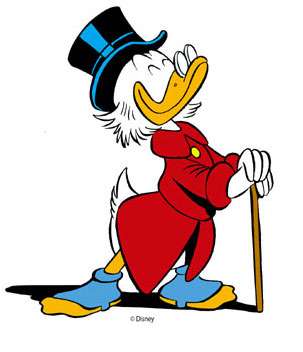
The richest, and probably the cheapest duck in the world. He made his wealth by being tougher than the toughies and smarter than the smarties, and he made it square. He resides in a large bin full of money (which he loves to dive around in like a porpoise, burrow through like a gopher, and toss it up and let it him on the head) in Duckburg, constantly seeking to increase his wealth.
- Adventurer Archaeologist: Although not formally educated, this is what he does in his spare time.
- Art Evolution: It took about four years until Barks settled on the final design for the character.
- Badass: In Backstory.
- Badass Grandpa: In the present day.
- Barefoot Cartoon Animal: He wears spats, but no shoes.
- Blue Blood
- Breakout Character: He was introduced as just a wealthy miser uncle for Donald Duck by Carl Barks, and took off in popularity to become a famous character in his own right.
- Byronic Hero: In some portrayals, most famously chapter 11 of The Life and Times of Scrooge McDuck.
- Cane Fu: In the present era, as he needs to use a cane to get around but retains his fighting spirit and Badass nature, he naturally uses it as his main weapon.
- Celibate Hero: He's been in relationships (notably Goldie), but never married.
- Character Development/Characterization Marches On: Scrooge was introduced as a genuine Jerkass, a Robber Baron who was ruthlessly stingy and greedy, well surpassing the meanness and cruelty of his Charles Dickens namesake. As the character became more and more popular and Barks discovered how much potential he had as a protagonist, though, he became a much more heroic figure. This was the interpretation that Don Rosa preferred, and he even used his magnum opus, The Life and Times of Scrooge McDuck, to explain just how Scrooge could have gone from the hardnosed but good-hearted individual he was in his youth and who he returns to being in the "present" to being the crusty, curmudgeonly skinflint he is when he first appears in the Disney Duckiverse.
- Chaste Toons: Definitely in the sense of the trope's function.
- Cool Old Guy: Not only does he have a past stuffed fit to bursting with fabulous adventures, he keeps on adventuring despite his advanced age.
- Deadpan Snarker
- Depending on the Writer: Scrooge's ruthlessness and adherence to ethics. Older Italian comics (particularly those written by Guido Martina) tended to portray Scrooge much more in line with his initial Jerkass characterization, veering into Corrupt Corporate Executive territory. Barks himself went back to a more ruthless Scrooge in a few Donald-centered gag stories.
- DuckTales (1987), notably, goes the other way, turning Scrooge Lighter and Softer by giving him an openly sentimental streak and sense of family values that he seldom, if ever, displayed in the comics.
- Determinator
- Early-Bird Cameo: Though it may be a pure coincidence, a character closely resembling Scrooge made an appearence in the short The Spirit of '43 as Donald's "thrifty saver" conscience four years before Scrooge's actual debut in comics, though whether Scrooge as we know him was based on this character is presumably something that only Carl Barks himself would have known.
- Fiction 500
- Genre Savvy
- Good Is Not Nice: After he fully grows into his mainstream characterization, Scrooge is an honest man who does care for his family and holds onto his scruples with an iron grip... but he's also cranky, bad-tempered, and a major skinflint.
- Greed: His defining negative character trait.
- Green-Eyed Epiphany: In his relationship with Brigitta, Scrooge typically avoids her. But when he sees other males interested in her, he surprisingly often (Depending on the Writer) turns into an Crazy Jealous Guy.
- The Gump: Especially in the comics, Scrooge is legendary for the number of famous historical figures he's interacted with.
- Hero with Bad Publicity: Because of his bad attitude, people are afraid of him, even though he's really not a bad person.
- Honest Corporate Executive: And proud of it.
- Jerkass Facade: Formally established in in the Barks comic "Back to the Klondike." He likes people to think he's a heartless skinflint, because it means that less people try to beg or mooch off him. In one story, disillusioned by how many people outright hated him, he tried to drop the facade and become a philanthropist, only to have everyone walk all over him to such an extreme that he immediately put the facade back up.
- Jerk with a Heart of Gold: Once character development takes him away from being an actual Jerkass and one learns to see through the above-mentioned Jerkass Facade.
- Knight in Sour Armor: Scrooge is quite a heroic character, for all his sour, cynical outlook on life.
- Lonely at the Top: One of Scrooge's most important life lessons; if you do get wealthy and powerful, friendship is pretty much something you'll have to forsake.
- Manipulative Bastard
- Morality Chain: His Sisters until 1909 and finally left after 1930.
- Morality Pet : Donald and the triplets in the present.
- Mr. Vice Guy: Former and rightful Trope Namer.
- Money Fetish: As if there's any doubt.
- Non-Idle Rich: Scrooge has to keep earning money - business deals, treasure hunts, lucrative gambles - or else he sinks into depression.
- Number One Dime: Trope Namer, though whether he actually fits the trope varies from writer to writer -- Carl Barks and Don Rosa portray the titular dime's only value as being sentimental (and, for Magica de Spell, sympathetic - it's powerful because it belongs to Scrooge, it's not inherently magical), other writers play this trope straight. Carl Barks did write a story in which Scrooge had an actual Number One Dime; a magical hourglass that, when upset, caused his fortunes to start drying up.
- Prospector: Scrooge's first big break came while he was prospecting, though it took him years of hard work. He's prospected for gold, copper, oil, silver, uranium, and just about anything that one can prospect for.
- Screw the Money, I Have Rules: Because he has rules he's able to earn even more money.
- The Scrooge: He's named the way he is for a reason.
- Self-Made Duck: And he's extremely proud of this fact.
- Thrifty Scot: In the Don Rosa canon, this is a family trait of the McDuck Clan, and it's one they're very proud of—the ghosts of Scrooge's ancestors ensure he survives a would-have-been fatal injury when they discover his destiny is to become the most tightfisted tightward the world will ever see. In fact, one of Scrooge's ancestors lost a battle (and his life) because he was too cheap to buy arrows for his archers.
- Uncle Pennybags: When in a good mood.
- Violent Glaswegian: He's Scottish, has a real short temper, and won't hesitate to get violent.
- What Could Have Been: It took twenty years from Scrooge's first appearance in comics (Christmas on Bear Mountain, 1947) to his first proper role in animation (Scrooge and Money, 1967) -- and twenty more years until he became a star character in animation (DuckTales (1987), 1987) -- but there was actually talk of bringing Scrooge to animation much sooner. In the fifties, when Scrooge's solo comic was beginning to really get popular, The Disney studios contacted Carl Barks to ask him to provide a story for a Scrooge McDuck cartoon, and Barks complied. According to Barks, the story was based around a similar concept to the opening parts of Only A Poor Old Man, with Scrooge trying to convince Donald how happy and carefree the life of a rich man is, while at the same time nearly suffering breakdowns at the thought of thieves or other threats to his money. For some reason, Disney ended up not using this story, and as they couldn't seem to get a grasp on the character of Scrooge at the time, the cartoon was never made.
Donald Duck
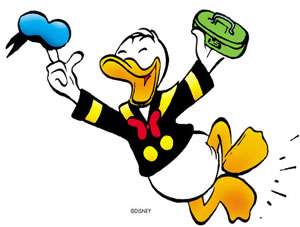
Scrooge's nephew, who has to tolerate living with his three nephews, being dragged along for treasure hunts, fighting annoying neighbors and cousins, and being between jobs.
- Chaste Toons
- The Chew Toy: It's toned down in the comics compared to the cartoons, but he still tends to end up through the wringer.
- The Complainer Is Always Wrong: Often, in the adventures he shares with Scrooge and his nephews, Donald is the one most reluctant to come along, and who complains the most... so he's also the one who suffers the most hardships.
- Cool Car: Donald's old 313 (a 1934 Belchfire Runabout) straddles the line between this and The Alleged Car.
- Crouching Moron, Hidden Badass: Most notably as the Duck Avenger, where he sometimes reached near-Batman levels of hyper-competence, but he has many moments where he gets to be Badass just being himself.
- Deadpan Snarker
- Demoted to Extra: In DuckTales (1987) he only appears in a handful of episodes.
- Determinator: As soon as Donald starts to obsess about something, he'll go to any length.
- The Drag Along: Donald is frequently this when treasure-hunting with Uncle Scrooge.
- The Everyman
- Genius Ditz: He's a duck of many talents. Unfortunately, his biggest and most consistent talent seems to be screwing things up for himself whenever things are going well.
- Get Rich Quick Scheme. If only they ever worked out...
- Hair-Trigger Temper: Much less prominent in the comic book incarnation of Donald than in his animated counterpart, but still very much a part of his character—after all, he wouldn't be Donald Duck without it.
- Jerk with a Heart of Gold: No matter how bad-tempered, self-centered or otherwise annoying he may act, he genuinely does care for his nephews and will sacrifice just about anything for their sake.
- The Lancer: Serves this role when forced to accompany Uncle Scrooge.
- Miles Gloriosus: While he often displays amazing talents, he's got a tendency to brag and exaggerate, promising more than he can deliver. Usually his faith in himself is unshakable—until he's actually called upon to do all those things he's bragged about.
- New Job Episode: Donald has much trouble getting jobs. When not working for Scrooge, he is most commonly shown working in a skunk oil factory or a margarine factory, jobs he understandably hates.
- Even so, Donald seems to be doing very well for himself at the margarine factory, at least. He once took a test of skills, and the conclusion was that the ideal job for him would be packing margarine.
- DuckTales (1987) sent Donald off to the Navy for the length of the series, as a plot excuse to leave the three nephews with Unca Scrooge.
- It also helps them skip around the problem of him being a main character while keeping the defining trait of his animated self; a voice that is functionally impossible to understand.
- A common plot in comics is that Donald starts in a job, and is amazingly good at it, earning money and becoming famous – until he makes a huge mistake that destroys the house, the garden, the road or whatever he’s a specialist in, and has to flee the town.
- Typically, its his arrogance which causes the fateful mistake. He could be anything from a gardener to an explosions expert. He pretty much creates works of art. His confidence increases with each successful assignment. Then he is offered a more demanding assignment, which seems to him like his crowning achievement. At this point he a) attempts to do by himself a job which would require one or more assistants, b) seriously underestimates the difficulties in accomplishing his goal or c) his single-minded pursuit of his goal prevents him from taking a rest, re-assessing the situation, etc. The scene is set for a spectacular disaster.
- Supreme Chef: Depending on the Writer to a very high degree, and some comics even depict him as a Lethal Chef, but in most stories where it comes up he's actually a good cook—not quite in Grandma Duck's class, and often limited by the fact that he can't afford to buy the proper ingredients, but a talented enough chef that family members will come running when he's doing the cooking.
- The Unintelligible: Subverted in the comics, since there his dialogue is written for us to read.
- Played straight on DuckTales (1987), though, where it's a Running Gag for people to ask "What did he say?"
- Unlucky Everydude: Although not as bad as in the Disney animated canon, Donald still tends to have absolutely rotten luck.
- Unsympathetic Comedy Protagonist: In several stories.
Huey, Dewey and Louie
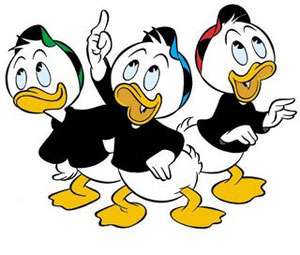
Donald's nephews (and Scrooge's grandnephews), living with their "Unca Donald," rising within the ranks of the Junior Woodchucks, and causing trouble at home.
- Bratty Half-Pint: They were this when they first appeared. Not so much nowadays.
- Chromatic Arrangement: Their colors have varied wildly, Depending on the Colorist, but in the late 1980s it stabilized as Huey/red, Dewey/blue and Louie/green.
- Another common combination in the comics is, or at least was, Huey/blue, Dewey/green and Louie/Red. The change of colors was usually ignored, but sometimes Lampshaded and explained as the boys sometimes borrowing each others' clothes.
- Deus Ex Machina: Their Junior Woodchuck guidebook. There's an entry on how to make dragons sneeze in it, for crying out loud!
- The Dividual: The twindividual variety.
- Expy: They actually started out as Expys for Mickey's two nephews, Morty and Ferdie, who until the introduction of Huey, Dewey and Louie actually made several appearances in Donald's comic strip, sans Mickey, in order to torment him with pranks and childish mischief. After a while, it was decided to give Donald his own nephews—and as a way of one-upping Mickey, Donald got three bratty, identical nephews instead of just two. Of course, since they only had a couple of animated appearances and starred in far fewer comics, today Morty and Ferdie aren't one-tenth as well-known or popular as Huey, Dewey and Louie are.
- Great Big Book of Everything: The Junior Woodchuck Guidebook, see below.
- Identical Twin ID Tag: The color of their clothes, at least nominally. In reality, the colorists often vary wildly on which boy wears which color, and since they also wear identical black shirts in the comics and often go hatless or are wearing identical Junior Woodchucks coonskin caps, it's often impossible to tell who is who.
- Insufferable Genius
- Not So Different: The nephews are as enterprising and risk-seeking as their Unca Scrooge, which is how he warms to them (and why Scrooge sometimes sees the trio as his true heirs over his more skeptical, less-driven nephew Donald).
- Parental Abandonment: Their mother is Donald's sister Della Duck, and she apparently asked Donald to take care of them while their unnamed father was spending time on a hospital. And she was never heard from again...
Scrooge: I'm not used to relatives either. The few I had seem to have... disappeared.
Huey, Dewey and Louie: We know how that feels, Unca Scrooge.
- Single-Minded Triplets: More apparent in earlier stories, where they were often literally treated as one character with three separate bodies, to the point of sharing all their spoken lines. The trope is still in effect in later stories, but the boys seem to have at least stopped speaking in union and finishing each other's sentences.
- DuckTales (1987) occasionally subverted the trope by giving them individual character traits—Huey as the energetic leader, Dewey as the smart guy and Louie as the gentle, good-natured tagalong. Quack Pack took these traits and ran with them, making the three boys distinct individuals and completely averting the trope.
- The Smart Guy: All three of them share this role when out adventuring with Donald and Scrooge, making for a Five-Man Band with one Hero (Scrooge), one Lancer (Donald) and three Smart Guys.
- Theme Triplet Naming
- Wise Beyond Their Years
Daisy Duck
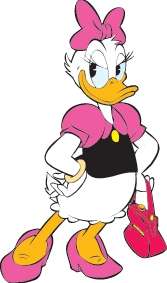
Donald's girlfriend, who is almost as temperamental as he is, but does have somewhat better self-control.
- Blue Eyes: In Quack Pack.
- Diary: Many of the stories starring her are framed as her diary entries, complete with captions where Daisy acts as First Person Narrator. The idea seems to have started with Dell devoting Four Color Comics #600 (November, 1954) to "Daisy Duck's Diary" which featured stories in this format. The idea proved successful enough for one issue each year devoted to new stories from Daisy's Diary. This sub-series lasted from 1954 to 1961. In 1964, Daisy's Diary was revived as a feature in "Walt Disney's Comics and Stories" with several stories published over the next few years. In 1965, new "Daisy's Diary" stories started being created and published in Italy. Followed by Brazil a few years later. This subset of stories has continued into the 21st century. The Inducks database counts 297 stories of "Daisy's Diary" published between 1954 and 2008. Not bad.
- Double Standard: Daisy often gets away with leaving Donald for Gladstone whenever it suits her, making ridiculous demands from and sometimes downright mistreating Donald. In her defense, Donald isn't always portrayed as being an all that reliable boyfriend either.
- Half-Dressed Cartoon Animal: Among the Disney Ducks, Daisy is the one that plays the most with this trope: when half-dressed (like in the picture) her rear feathers resemble bloomers, and sometimes she even wears dresses or pants (while everyone else keep their traditional wardrobe).
- Intrepid Reporter: In Quack Pack and Brazilian comics.
- Positive Discrimination: In the Brazilian comic stories about the McDuck TV channel, Daisy is a way more savvy and effective reporter than Donald and Fethry. Donald gets close to her level sometimes, but Fethry never does.
- Tertiary Sexual Characteristics: though Depending on the Artist she can feature additional physical differences from Donald, like a smaller beak and a somewhat curvaceous upper body.
- Tsundere
Gyro Gearloose
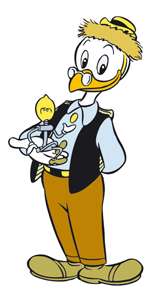
Duckburg's local inventor, who frequently works on strange and often useless inventions that have a tendency to end up in the wrong hands. Donald and Scrooge are his friends and his most frequent customers.
- Bungling Inventor: Sometimes, though his inventions do tend to work perfectly—when problems arise, it's usually due to some detail Gyro has failed to consider, or simply due to unfortunate circumstances.
- Chaste Toons: Like so many other Disney comics characters, Gyro too has a nephew, whose name is Newton and who sporadically shows up in stories.
- Ditzy Genius: He's brilliant, but sometimes his genius overrides his common sense.
- Mr. Fixit
- Nice Guy: One of the most genuinely nice guys in the Universe. Tends to veer into Extreme Doormat territory: he has a hard time asking for money for his service, even if it's just to cover his expenses. Which explains why Scrooge is his best costumer.
- Inner Monologue: Prone to these in his first solo stories—before the introduction of Little Helper, which gave him someone to actually talk to.
- The Professor
- Reed Richards Is Useless: Gyro seems to be capable of inventing almost anything, but generally doesn't focus his work on anything that might be of any use to the world unless asked to. Granted, this may be for the best, since his inventions often go horribly wrong in stories where Scrooge tries to sell them.
- There's one excellent story when he actually succeeds in moving Duckburg into the future, but the people aren't ready for it.
- Workaholic: loves his job to no end. Attempts to take a vacation or just relax will inevitably end in him inventing new gadgets to relax better.
Little Helper
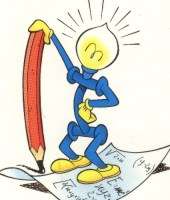
Gyro's tiny, robotic assistant, who aids him with his many inventions and is sometimes hinted to be just as smart, if not even smarter, than Gyro. Usually he's mostly a Funny Background Event character, but he does occasionally play important parts in the plots and even gets a few Day in The Limelight episodes now and again.
- His Name Really Is "Barkeep": He's never given any actual name other than "Little Helper" or, more commonly, just "Helper."
- He gets a name in some translation - such as "Edi" (after Edison) in Italy, "Lampadinha" ("little lamp") in Brazil or "Filament" in France.
- Only Sane Robot: Where Gyro tends to get carried away with his own brilliance, the Helper is usually far more practical-minded and can generally spot disaster long before it actually happens.
- Robot Buddy: With a lightbulb for a head. As revealed in one of Don Rosa's stories, he was originally just an ordinary table lamp that was exposed to the rays of Gyro's prototype "think box" used in one of Carl Barks' earliest Gyro stories, which animated him and gave him sentience. After Gyro initially gave him a set of wheels to allow him to explore a small hole leading to a cavern where all of Scrooge's money had fallen into when the foundations of his money bin gave out, he then replaced the wheels with arms and legs, and the rest is history.
- The Speechless
- The Watson: Despite not actually being able to talk, he was created by Carl Barks to fulfill this very role: So that Gyro, in his solo stories, could have someone to talk to and explain things to. According to Barks, this seemed less depressing than constantly having Gyro alone and providing exposition through an Inner Monologue.
Gladstone Gander
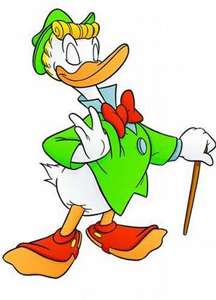
Donald's impossibly lucky cousin. Gladstone's incredible luck allows him to live a life of leisure without ever doing anything resembling working, much to Donald's chagrin. He is Donald's heated rival in almost everything, including Daisy's affections. Everybody -- including the writers -- loves to hate this guy, but of course, the "Lucky Bastard loses his luck" plot would lose its meaning if overdone; it was actually very rarely used in the comics and only once in the DuckTales (1987) Animated Adaptation.
- Born Lucky: Literally.
- Brilliant but Lazy: Gladstone is so ridiculously lucky he could probably become richer than Scrooge with no effort, but lacks the ambition to do so. Gladstone could even become Scrooge's heir if he weren't so lazy. The only reason Scrooge considers him a better heir than Donald is that Gladstone is least likely to squander the money.
- Characterization Marches On: In some of Gladstone's earlier appearances (Such as Wintertime Wager), his luck is not yet present, and he's basically a (slightly) more obnoxious version of Donald. Later, he got his infamous good fortune, and became that much more insufferable.
- Hidden Depths: In most stories he averts this, but there have been stories where it's revealed that his constant good luck isn't always a good thing—when it comes down to it, Gladstone's lifestyle and attitude has left him with absolutely no friends and only marginal support from his family. A few stories have speculated that this is the real reason he enjoys riling Donald up so much; it's the closest thing he has to a friendship.
- Jerkass: In the comics. He's actually pretty nice to his relatives in Duck Tales, coming off more as a cheerful guy who's oblivious to the fact that not everyone's as lucky as he is.
- Jerk with a Heart of Jerk
- Lazy Bum
- Lucky Bastard
- Pet the Dog: Occasionally -- very occasionally—he'll have a few moments where he does this and employs his incredible luck for the benefit of others and not just himself. Notable examples are Christmas for Shacktown [dead link] and A Little Something Special. [dead link]
- Rich Idiot With No Day Job
- He worked once, earning a dime. That job and the dime are his greatest shame.
- Small Name, Big Ego
- Smug Snake
Fethry Duck
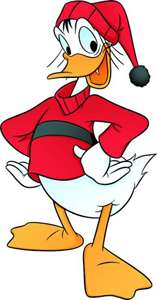
Donald's eccentric cousin who seems to take on a new obsession every week, but as all of his information on his obsession usually comes from books, TV shows, self-help videos and the like, he often messes up his attempts to apply his "knowledge" and is blissfully unaware of the trouble he causes for everyone around him (especially Donald). Despite Fethry's being an American invention, his stories weren't printed in English until relatively recently. Instead, he enjoyed popularity in other countries, Brazil going as far as to give him his own solo comic, complete with nephew (just one), girlfriend (she's a long-suffering artist), and superhero alter-ego (The Red Bat, borderline useless). He is not part of Barks/Don Rosa canon, though some versions of the Duck family tree do place him there.
- Cloudcuckoolander: As he might say: "Having your feet on the ground just means you're standing still."
- Crouching Moron, Hidden Badass: Not as frequently as Donald, but he does have some moments where he manages to step up and pull off some genuinely awesome stunts. He's mostly liable to do this in the TNT (Tamers of Nonhuman Threats) stories.
- Depending on the Writer: Can become a borderline Load under certain writers.
- The Determinator: When he gets an idea, he'll see it through to the end no matter what... or at least until he gets a new idea to be obsessed about.
- Ditzy Genius: Though as (bad) luck would have it, his tactlessness and lack of common sense punish others around Fethry more than Fethry himself.
- Freudian Trio: In many stories Donald is the id, Fethry is the ego, and Gladstone is the superego.
- Genre Savvy: Not so much in his normal, day-to-day life, but shows distinct traits of this as a TNT agent; a lifelong obsession with fantasy, sci-fi, horror and the supernatural has taught him just about every trick in the book, which comes in useful when going out to deal with real monsters.
- Granola Girl: A rare young male example.
- Heavy Sleeper: As Characterization Marches On.
- I Want My Beloved to Be Happy: Fethry selflessly dotes on Donald and considers him his favorite cousin, genuinely wishing to improve things for Donald whenever possible. You can guess about how well that works out.
- The Klutz: He has traces of this and is responsible for inadvertently setting off a number of Slapstick routines.
- Man Child
- Nice Guy: There's absolutely no guile or malice to him, and he genuinely wants to help everybody (and especially Donald). His ways of helping people, however, generally lead them to wish he wasn't so helpful.
- Soapbox Sadie: Occasionally, but unlike most examples of the trope he's hardly ever a soapbox for the writers and is probably wrong more often than he's right.
- Stalker with a Crush: While it's obviously not a romantic interest, Fethry adores Donald's miserable pet tomcat, Tabby, and behaves in Elmyra-like fashion when Tabby is near.
- Vitriolic Best Buds: Classic Type 1, with Donald. Fethry drives Donald insane on a regular basis, but he is one of the very few people in the Disney Ducks Comic Universe who genuinely likes and appreciates Donald as a friend.
- Wacky Guy: Part of Fethry's charm is that he allows Donald to play the Straight Man to him in many stories.
Grandma Duck
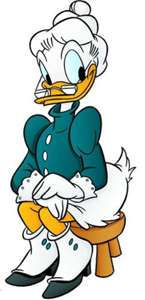
Donald, Fethry and Gladstone's grandmother and Huey, Dewey and Louie's great-grandmother. She lives at a farm outside Duckburg with her gluttonous, incredibly lazy farmhand Gus Goose (Donald's cousin), and is renowned for her pie-baking skills. Her rarely heard real name is Elvira Coot.
- Depending on the Writer: According to Don Rosa, she is Donald's paternal grandmother and therefore not related to Scrooge at all, but before that, in European comics, it was widely accepted that she was Scrooge's sister and actually Donald's aunt—and Huey, Dewey and Louie's real grandmother. With the publication of the Duck family tree which shows her as Donald's grandmother, this has largely been forgotten.
- Cool Old Lady: While she can be strict, especially in early stories, she's also kind and loving... not to mention, she can be tough as nails when she needs to be.
- Granny Classic
- Honorary Grandma: She is called "Grandma" by pretty much everyone.
- June Foray: Provided her voice in her very few animated appearances.
- Supreme Chef
- Team Mom
Gus Goose

Grandma Duck's incredibly lazy and gluttonous helping hand.
- Big Eater / Extreme Omnivore: It makes you wonder how he got to be the chef on House of Mouse.
- Depending on the Writer: An interesting variation here, as both comics and cartoons portray Gus as lazy and gluttonous... but whether he is more greedy or lazy depends on the media. In the cartoons, Gus's defining trait is his appetite; most of his appearances are almost solely dedicated to him eating huge amounts of food. In the comics, however, Gus (while still a Big Eater) is far more likely to be found asleep under a tree or thinking up ways to do the least possible amount of work.
- Lazy Bum
- Nice Guy: Despite being incredibly lazy, always shirking work, and always eating more than his fair share, he's actually very soft-hearted. In one story, it turned out that the reason he hadn't fetched the mail in weeks was that two birds had made a nest in Grandma's mailbox, and Gus didn't have the heart to disturb the baby birds.
- Ultimate Job Security: The only logical explanation for why Gus hasn't been fired is that he's Grandma Duck's nephew, as she crossly reminds us now and then.
- There is another theory (spoilered because you may find it inappropriate): Gus is actually Grandma's lover.
- There have been a couple of stories where Gus (temporarily) either got much more energetic, or Grandma hired another farmhand to help out—every time, Grandma ended up going nuts because all of a sudden there wasn't enough work left for her.
- Supreme Chef: In general, he's far more interested in eating than in cooking, but on the rare occasions when he does cook, he's almost as good as Grandma (he has, after all, picked up a lot from her).
- The Voiceless: In the cartoons he only utters the occasional honk, but in the comics he's a fully-voiced character.
April, May and June
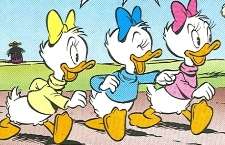
Daisy's three nieces, and more or less Distaff Counterparts of Huey, Dewey and Louie. Unlike HD&L, however, they live with their mother (Daisy's unseen and unnamed sister) and only occasionally stay with their aunt.
- Chromatic Arrangement: Only in about half their appearances do the girls follow the classic red/blue/green scheme; they're often seen to wear yellow/magenta/cyan, and sometimes they discard the chromatic part and wear yellow/purple/orange—and sometimes they all wear the same color. It's impossible to say which color belongs to which girl, as they never got an official color assignment.
- That said, some fans have assigned April with the blue clothes, as that was the color she wore when she appeared solo in one story.
- Also, in more recent Dutch comics, the girls have gained more modern appearances and can now be told apart by their hairstyles [dead link] : April wears her hair in a ponytail, May has short hair and wears a headband, while June wears twin pigtails.
- That said, some fans have assigned April with the blue clothes, as that was the color she wore when she appeared solo in one story.
- Distaff Counterpart: Few Disney characters are this blatant about it.
- The Dividual: Like Huey, Dewey and Louie, the girls look and act pretty much the same. so it's impossible to say if they have any individual character traits.
- Out of Focus: The girls were never major characters in the comics, and with the advent of DuckTales (1987), where their combined Expy Webby appeared, they seem to have been phased out, maybe to avoid confusion. Since the eighties they have only made very occasional cameos.
- However, this is again avoided in the Dutch comics, where the girls have made more appearances with their modernized looks. Certain Danish stories have also begin featuring the redesigned girls, so it remains to be seen whether they'll make a glorious return.
- Identical Twin ID Tag: Again, in the modern Dutch comics, their hairstyles. In older comics, the colors of their clothes is probably supposed to be this, but since the girls' colors are even more inconsistently handled than Huey, Dewey and Louie's are, this really doesn't help.
- Parental Abandonment: Surprisingly enough, averted. Though their mother never appears on-page and isn't referred to very often, the girls first show up in a story where Daisy is visiting her sister, and introduces her three nieces to Donald. Presumably, they still live with their mother (though we don't hear anything about their father).
- Theme Triplet Naming
- Wise Beyond Their Years
Glittering Goldie O'Gilt

Scrooge's love interest from his gold prospecting days, "the only live one I ever knew."
- Defrosting Ice Queen
- Getting Crap Past the Radar: The comics featuring her also heavily feature this trope out of necessity.
- Jerkass Facade
- Love At First Punch: Drugging and robbing a guy and dumping him in a ditch is not your typical foundation for a relationship.
- Love Hurts
- New Old Flame
- The One That Got Away
- Plucky Girl
- Slap Slap Kiss To put it mildly...
- Stockholm Syndrome
- Trigger Happy
- You Got Spunk: "She has grit."
Ludwig von Drake
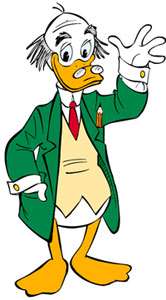
An absent-minded scholar/inventor who is referred to as Donald's uncle (according to Don Rosa, he is/was married to Scrooge's sister Matilda, making him Donald's uncle by marriage) and an expert on everything. He originally appeared in Walt Disney's Wonderful World of Color, but has since appeared as a recurring character in comics by some authors. He appears very rarely in stories by Carl Barks and Don Rosa. Has become somewhat similar to Gyro, which is probably why you rarely see the two together. Just remember, Ludwig is The Professor first, and a Bungling Inventor second, while Gyro is the other way around.
- Ditzy Genius: Even moreso than Gyro, in fact. There's no doubt that he's brilliant in every way, but he's also somewhat of an eccentric, at times bordering on being a Wonka—or, Depending on the Writer, even a full-fledged Cloudcuckoolander.
- Insufferable Genius: On a bad day. But even on a good day, humility is not his strongest suit.
- Mr. Exposition
- Out of Focus: In later years he hasn't been used much in comics—in fact, for some years Egmont Creative A/S, the main publisher of Disney comics in Europe, completely banned any use of the character, because editor and creative leader Byron Erickson considered him superfluous; there was nothing Ludwig could do that Gyro Gearloose or the Junior Woodchuck Guidebook couldn't. However, the ban seems to have been lifted in recent years, though Ludwig is still a minor character in the comics.
- Strangely enough, another character that was banned from use at Egmont was Launchpad McQuack, and when asked why the two characters were not seen in Disney comics nowadays, Byron Erickson famously answered: "Ludwig and Launchpad ran off to Las Vegas, where they came out as transvestites and joined a drag show."
- The animated version of Ludwig, however, remains fairly central and is usually the character who appears whenever Mickey Mouse or his friends need a scientist to explain things.
- Omnidisciplinary Scientist: In fact, he'll constantly point out all the various fields he's an expert in. Usually he's right about it too, though he doesn't always go on about things in the most sensible way.
- The Professor
- Sesquipedalian Loquaciousness: Tends to overcomplicate things.
Rumpus McFowl
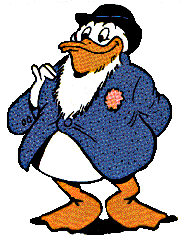
Scrooge's lazy, freeloading, overweight half-brother. Created by, and so far used exclusively by William Van Horn.
- Acrofatic: He's old and fat and lazy, but can really move when he wants to.
- Big Eater: Especially when it's other people's food he's eating.
- Jerkass: He doesn't have very many redeeming qualities, and in fact seems determined to be as irritating and pushy as he possibly can be towards his poor relatives.
- Though in some stories he does seem to have a slightly soft spot for his half-brother Scrooge and gets a few minor Pet the Dog moments when he at least tries to get along with him.
- Karma Houdini: He tends to be this, even when it looks like it's going to be subverted; in fact, the two first stories he appeared both ended with him, after driving Donald and Scrooge insane, injuring himself and becoming bed-ridden for weeks... which meant that he got to happily lie about in Donald's bed while Donald had to wait on him hand and foot.
- Lazy Bum: A strange version; he energetically puts every bit of effort he can into being extremely lazy, and does it in such a way that he's as annoying as possible.
- The Load: Treated as one in-universe. Every single Duck family member dreads it when he's coming over for a visit, because they know he'll eat all their food, hogs all their things, and keeps them awake all night with his infernal snoring, which can be heard through concrete-thick walls.
- No Social Skills: Though it doesn't seem to be the cause of any strange upbringing or Asperger's Syndrome or anything like that—Rumpus probably could be a socially well-adjusted person if he made the effort; it's just that he does not care enough about anyone who isn't him to even bother trying.
Brigitta MacBridge
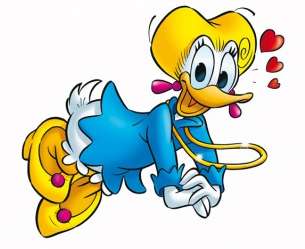
A shrewd businesswoman duck whose main goal is to one day marry Scrooge McDuck, even though he isn't interested in romance at all. Created by Romano Scarpa, Barks liked the character enough to give Romano a drawing of Brigitta trying to seduce Scrooge with a Money Scented perfume, which Romano then wrote a story based on said premise. The original drawing has been lost.
- Abhorrent Admirer: To Scrooge.
- Intergenerational Friendship: Occasionally with Daisy (at least it's implied she's moderately older). She also gets along very well with Huey, Dewey and Louie.
- Mad Love: She is perfectly aware that Scrooge doesn't return her feelings, but this doesn't stop her from hoping, and trying again, and again, and again...
- Platonic Life Partners: With Jubal—which is a definite case of Characterization Marches On, as the two were definitely not friends in the first story Jubal appeared in.
- Plucky Girl
- Stalker with a Crush: To Scrooge, though the actual stalking has been toned severely down since her early appearances.
- Woman Scorned: Many stories starring Brigitta have her being rudely rejected by Scrooge, then starting her own business trying to outperform him. Sometimes she even succeeds.
- Zany Scheme: She's really good with them... they actually succeed a fair number of times too.
Jubal Pomp
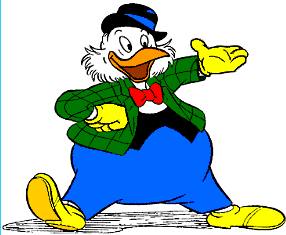
A younger businessman (about Donald's age, it seems) who really wishes he could be successful like Scrooge, but doesn't really have what it takes, despite being just as eager (and usually just as honest). A friend (and nothing more) and protegé of Brigitta MacBridge. When working with her he can usually accomplish more than on his own. Like Brigitta, created by Romano Scarpa and used mainly in Italian comics, where he is named Filo Sganga.
- Catch Phrase: "Business is business!" - And that's pretty much all he knows about business.
- Characterization Marches On: In his first appearance he was the villain of the story. In later appearances he became more sympathetic, but was still a bit of a cheat and a con man. Later still, he became an out-and-out good guy with only the occasional lapse into dishonesty.
- Clean Dub Name: Sort of. His first name in English was Jubal Cock...
- Everything's Better with Chickens: He's an anthropomorphic rooster of some sort.
- Honest John's Dealership: His business practices are sometimes close.
- Inconsistent Dub: The Norwegian translators have real difficulty agreeing on a name for this character.
- Platonic Life Partners: With Brigitta.
- Zany Scheme: Most of his attempts at business.
Ms. Emily Quackfaster
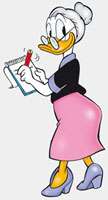
Scrooge's loyal and efficient secretary.
- Ascended Extra: The fact that Quackfaster was mostly just a background character in Carl Barks's stories probably contributed to her inconsistent portrayals.
- Depending on the Artist: For some reason, she is sometimes shown as being blonde and much taller than any of the other duck characters (rather than old, grey-haired and relatively short). Some artists go the middle road and make her the same height as the other ducks, but make her look younger.
- Depending on the Writer; Quackfaster's name is inconsistent between writers. Her British name is "Miss Typefast," and is occasionally left in American rewrites by mistake. She was "Miss Featherby" on DuckTales (1987), where writers evidently Did Not Do the Research. Her first name, "Emily", was invented by Don Rosa.
- Plucky Girl: On some occasions.
Bolivar/Bernie/Bornworthy
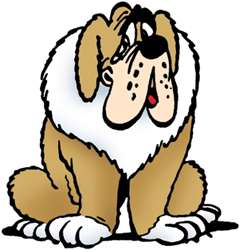
Donald's lazy and stupid St. Bernard, who is generally much more at home sleeping in front of the fireplace than he is going out on adventures and suchlike. Doesn't appear in many stories, but generally makes himself known in a big way when he does appear.
- Characterization Marches On: He first appeared in the cartoon The Alpine Climbers where he was a genuine rescue dog who stoically braved the icy alps to rescue Mickey, Donald and Pluto. When he was brought over to comics as Donald's pet, he pretty much lost his stoic heroism and became a lazy, stupid coward who hates the cold and runs inside to huddle by the fireplace the moment a snowflake falls.
- Depending on the Writer: His real name is Bolivar, but due to fear that this might be seen as a slur on Simon Bolivar, writers have named him "Bernie," "Bornworthy," "Bolly" and "Bornie." Nowadays, most writers use his original name, though.
- Furry Confusion: Bolivar is on the same anthropomorphic level as Pluto; i.e. he's mostly just a dog...
- Hidden Depths: ...but there are hints that he may be smarter than he lets on. In one story, as a Funny Background Event, he plays checkers with Gyro's Helper, and wins.
- Ironic Fear: He's a St. Bernard who's afraid of snow. Donald even Lampshades it on occasion. [dead link]
The Junior Woodchucks
The Scouting organization that Huey, Dewey and Louie are members of, created by Carl Barks as a parody of the Boy Scouts. There are, or at least there are implied to be, several thousand members of the Junior Woodchucks on a global basis, though the Duckburg troop is the oldest and original one. In most stories, HD&L are the only named characters in the organization, though several writers and artists have their own recurring background characters to fill out the ranks, plus a never-ending stream of troop leaders and generals with pompous and silly titles.
- Crazy Prepared: Taking the "Be Prepared" motto to ludicrous extremes, members are pretty much required to be this.
- Fun with Acronyms: The Junior Woodchucks have dozens, if not hundreds, of long-winded titles, both positive and negative, all of which are acronymed. Some examples are O.G.U.F.O.O.L. (Omnipotent Giver of Unimpeachably Full-bodied Observations on Omniscient Logic), B.I.G.D.O.P.E (Brazenly Impressive and Grandiose Door Opener and Party Entertainer) and A.N.S.W.E.R.M.A.N (Awesome Noteworthy Senior Woodchuck, Expert Researcher, and Master Archaeological Nitpicker).
- See here for a complete alphabetical listing of all the acronym-based ranks that have shown up in the comics: http://www.cbarks.dk/theseriesjwtitles.htm
- Great Big Book of Everything: The Junior Woodchucks' Guidebook is a pocket version of this; it has virtually all the information in the world gathered between two covers, including tons of information that doesn't exist anywhere else.
- Don Rosa's stories frequently lampshade the impossibilities of this, on some instances taking it even further—such as in the story W.H.A.D.A.L.O.T.T.A.J.A.R.G.O.N, where one tiny pamphlet with extratcts from the Guidebook still holds enough information for "a mere set or two of encyclopedias."
- One other story does reveal that the book does not contain the most basic information, things that are covered in elementary school. Trying to look up such information in the book will just lead you to a page that says something to the effect of "Any third-grader should know the answer to this, and if you don't, we have all reason to doubt whether you're even qualified to be a Junior Woodchuck."
- Merit Badges for Everything: As a vital part of the parodic aspects of the organization; the Woodchucks hand out badges for every big and little thing. Several stories show Huey, Dewey and Louie's collection of merit badges to be so huge by now that they literally fill up every closet, cupboard and storage space in Donald's house.
- Nice Hat: All members wear Davy Crockett-inspired coonskin caps. (Though modern stories underline that the caps are made of imitation raccoon fur, not the real thing.)
- Scout Out: Probably one of the most famous versions out there.
General Snozzie
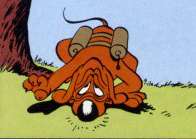
One of three official Junior Woodchuck canine mascots (both Pluto and Bolivar have functioned as Junior Woodchuck mascots in some stories), and by far the most talented of them. He's an expert bloodhound who can sniff out anyone or anything, and is hinted to be the smartest dog in the world.
- The Ace: As weird as it may seem to have an Ace who's a non-anthropomorphic, non-talking dog, General Snozzie manages to pull it off. Is there nothing this dog can't do?
- The Nose Knows: As a bloodhound, his skills are unsurpassed and taken to ridiculous extremes. He has two trainloads of trophies he has won in tracking competitions, He has tracked men in rubber shoes through aisles of fish markets...
- Scarily Competent Tracker: ...and even if the prey tries to confuse his senses, "he doesn't need to smell, see, or hear! He can track by Braille!"
The Clan McDuck
Fergus McDuck
Scrooge McDuck's Father.
- Happily Married :To Downy
- Together in Death.
Downy McDuck, née O'Drake
Scrooge McDuck's Mother.
- Happily Married :To Fergus
- Together in Death.
Matilda McDuck
The oldest of Scrooge's two younger sisters.
- Big Brother Worship : Until Chapter 11. When we meet her again as an old lady she inverts this trope by insulting Scrooge at every turn .
- it returns though when they finally reconcile.
- Hair of Gold
- The Heart
- Tranquil Fury : Unlike her siblings whenever she gets angry its this tope
Hortense McDuck
Scrooge's youngest sister. Also Donald Duck's Mother.
- Badass Adorable: Already as a little girl she was tough as nails, as a teenager she effortlessly chased and beat up fully grown men, and as a young adult she managed to chase away an entire army by chasing them with a broom.
- Belligerent Sexual Tension: With Quackmore Duck, Donald's father.
- Berserk Button: You name it.
- Fiery Redhead: In most printings
- Hair of Gold : In Others
- The Berserker: Broom Version
- Unstoppable Rage: Even moreso than her brother
- Missing Mom.
- The Unintelligible : As a baby her only words were "glxblt"
- We Named the Monkey "Jack": Scrooge names his horse in America "Hortense" in honor of his sister because they both have a bad temper. Hortense is not amused.
Villains
The Beagle Boys
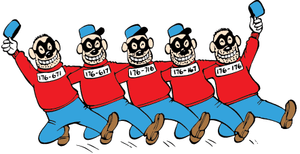
The Beagle Boys are a family of masked and usually not-too-bright thugs that unsuccessfully seek to rob Scrooge of his fortune.
- Card-Carrying Villain
- Characterization Marches On: In the Beagle Boys' early appearances, they actually represented a threat to Scrooge. Today they are incompetent buffoons who are usually easily thwarted.
- Not all the time. Italian-produced comics make them buffoons, but quite a number of Egmont and Dutch-produced stories feature the Beagles being quite menacing—the point typically being that while just a few Beagles are fairly inept by themselves, a large number can be quite effective crooks.
- Comic Trio: Many European comics feature the three "main" Beagles as this. 176-176 is the schemer, 176-761 is the stupid, food-obsessed moron, and 176-671 is the one who gets dragged along. Italian comics often add Grandpa Beagle to the mix as their hands-on boss.
- Depending on the Writer: Just how many Beagle Boys exist is very inconsistent. They are commonly shown three at a time, but in Don Rosa's stories, there are seven of them (who are occasionally aided by their much smarter grandfather, Blackheart). Some authors show the Beagle Boys to be all over the world in some form or another. Their relationship is also somewhat inconsistent. They are usually seen as being brothers, but according to Don Rosa they are actually a group of brothers and cousins.
- Even Carl Barks at one point showed them by the hundreds. They're implied to be a very large family with dozens of branches, but only one of them is usually active in Duckburg. He used thirty different numbers in his stories.
- Even Bad Men Love Their Mamas: In DuckTales (1987), at least. The closest thing to Ma Beagle in the comics is their grandfather or, occasionally, Granny Beagle.
- Evil Is One Big Happy Family
- Harmless Villain
- Informed Breed: They look nothing like real beagles.
- Karma Houdini: Ma Beagle in the first season of DuckTales (1987)
- Murder, Inc.
- Paper-Thin Disguise: The Beagle Boys constantly wear black masks that only serve to make them more recognizable (which was played in one story, where they robbed a jewelry store and the witness didn't recognize them because they weren't wearing their masks despite the fact they were otherwise dressed like typical Beagle Boys), since they never, ever take them off, not even when they are actually trying to disguise themselves. Let alone the prisoner's numbers on their chests.
- Don Rosa used to play with it, and in one occasion Barks draw one of them (young Blackheart) without his mask from stupefaction: here.
- Villain Protagonist: There are plenty of comic stories with the Beagle Boys as the main focus, often showing them trying to rob someone other than Scrooge for a change. It's these stories that usually features their Comic Trio characterizations.
- You Are Number Six: In the comics, the Beagles are only known by their prisoner's numbers—one story goes as far as to show a Beagle wondering what his name is, as his own mother preferred to call him by number. Averted in DuckTales (1987), where they all get names and different appearances (Word of God states that this was because the prisoner's numbers were too unclear as identity tags in animation.)
Grandpa Beagle/Blackheart Beagle
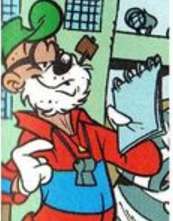
The Beagle Boys' grandfather, founder and occasional leader. In DuckTales (1987) he's replaced by Ma Beagle, and some of the fans assume that she's his wife.
- Big Bad: Mostly in Don Rosa's stories.
- Composite Character: Blackheart as depicted in Don Rosa's stories is based on two characters from two different stories by Carl Barks that may or may not have been intended to be the same character.
- Depending on the Writer: Not only does it seem to vary whether Blackheart Beagle is the same character as Grandpa Beagle or not, but Grandpa's personality tends to vary a lot depending on who's writing him. Carl Barks depicted him as a fairly calm old man (though still a Card-Carrying Villain), while in Don Rosa's stories he's more a hard-boiled Big Bad. Italian stories often feature him as the Beagles' scheming, hands-on leader and father figure who plans great coups and plays homemaker for his grandsons with roughly the same amount of enthusiasm.
- Genre Savvy: He's been around the block a few times and knows most of the old tricks.
- Good Smoking, Evil Smoking: In Italian stories, he generally plays this trope in an unusual way, since he's usually seen with a corn pipe in his mouth.
- Grumpy Old Man
- Surrounded by Idiots: Though the idiots are his grandsons, so while he can be strict and tough on them, he's seldom overly harsh.
Magica De Spell
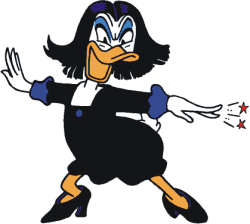
A sorceress who seeks to steal Scrooge's #1 dime and melt it in the fires of Mt. Vesuvius for a spell that could give her the power to turn any substance into gold.
- Arch Enemy: With Scrooge, and they have had a couple of Enemy Mine moments.
- Chaste Toons: A DuckTales (1987) comic gave her a niece named Minima, who's made several appearances in the foreign comics since then.
- Dark Action Girl: One of the earliest examples from Disney.
- Depending on the Writer: Just how much power Magica has varies between writers. Carl Barks and Don Rosa generally showed her as not having any genuine magical abilities on her own, but merely using magical trinkets, but many other writers show her as a powerful witch in her own right and interacting with many other powerful witches.
- In her third Carl Barks appearance she finds a hoard of magical items used by ancient witches, but before that she used hypnotism, gas bombs and quick disguises.
- Evil Sorceress
- Failure Is the Only Option
- Flanderization: How many people remember that her spell originally just required coins in general from various rich people? Barks himself feared this would happen.
- Barks himself played a part in this happening, despite desperately trying to avoid it. This also resulted in Flanderization of the Number One Dime itself, since by the original explanation it was "lucky" because it belonged to Scrooge, Scrooge was not lucky because of having it.
- Foe Yay
- Hey, It's That Voice!: June Foray provided the character's voice in animation and video games, and as a result, she sounds like Natasha Fatale.
- Hot Witch: Specifically created to invoke this trope; Carl Barks admitted that when he created her, he deliberately went against the "old, ugly crone" type of Wicked Witch so prevalent at Disney at the time, and instead created a witch that was young and pretty.
- Implacable Man
- Older Hero vs. Younger Villain
- Shiny Midnight Black
- Surveillance as the Plot Demands: When bored, she spends her free time spying on Scrooge in her crystal ball. Scrooge too has detectives who keep Magica under surveillance.
- Stalker with a Crush: See above. Common fan explanation for the above Flanderization as well.
- Villain Protagonist: She has starred in her own stories since the 1960s. With supporting characters including Mad Madam Mim, her blonde ward Witch Child (actually the bratty little girl of a witch neighbor), her brunette niece Minima, Granny De Spell, unwanted fiance Rosolio, etc.
- Witch with a Capital B: Used frequently in the Animated Adaptation.
Flintheart Glomgold
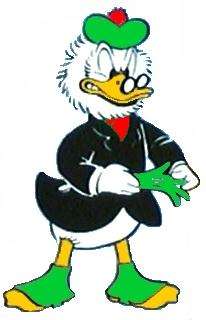
The second richest duck in the world, Flintheart Glomgold, just like Scrooge is a cheap old miser who lives in a bin full of money, except in South Africa; and just like Scrooge, Flintheart started his fortune from nothing. Flintheart, however, has none of Scrooge's integrity and didn't make his fortune square. Flintheart seeks to gain the status of the richest duck in the world, and unlike Scrooge, doesn't have much morality to slow him down.
- Arch Enemy: Due to Glomgold's role as Scrooge's Foil, his tendency for Kick the Dog moments, and the intensity of their competition, subsequent comics, cartoons, and video games have elevated Glomgold to arch enemy status in Scrooge's Rogues Gallery.
- Corrupt Corporate Executive
- Create Your Own Villain: In The Life and Times of Scrooge McDuck, Scrooge rescues an Afrikaner, who repays Scrooge by swindling him out of his supplies and deserting him in the middle of Africa. Scrooge makes it back to town and confronts the swindler, tarring and feathering him before the thief is mauled by Scrooge's lion. From his jail cell, the bushwhacker vows to become a somebody so he can one day get back at Scrooge. Guess who "Mr. Whatever-Your-Name-Is" turns out to be?
- Dub Name Change: A lot of Duckverse characters have their names changed, but an especially cool one could be the Polish one: Granit Forsant ('granite', and 'cash') - not only it matches lipsynch, has very close meaning but also the initials match as well.
- Depending on the Writer: He is sometimes shown living in Duckburg and being a member of Scrooge's Billionaire Club rather than living in South Africa.
- Et Tu, Brute?: See "The Terror of the Transvaal."
- Evil Counterpart/Foil/Shadow Archetype: Glomgold's whole character can be described as what kind of person Scrooge would be like if he never even tried to make his fortune square. Not to mention his lack of relatives and allies in comparison to Scrooge's large group of family and friends.
- Flanderization: In his first appearance, Glomgold wasn't especially dishonest- the story was more Scrooge Vs. Himself. The second story had him attempt to sabotage Scrooge's fortune in order to win a competition, but he was shown stricken with guilt at "betraying my dear old mother's fondest hopes" and "becoming a scoundrel- all to win the title of world's richest duck!" (at least until he was offered another chance to sabotage Scrooge, which he readily accepts) It was his third appearance that he became the bad guy he's known as today, attempting to murder Scrooge and his nephews multiple times.
- Humiliation Conga: He gets these in "The Last Lord of El Dorado", "The Terror of the Transvaal" and "A Little Something Special." Don Rosa seems to be fond of putting him through these.
- Master of Disguise: Since his third appearance, Glomgold has fooled Scrooge and his nephews numerous times with his disguises in order to stay one step ahead, sabotage, or both. Even his female disguise was once convincing enough for Donald to steal a kiss!
- My Name Is Not Durwood: In the DuckTales (1987) episode "Attack of the Metal Mites", Dijon could never pronounce his name correctly.
- Also, his second appearance "The Money Champ" (September, 1959) has several people failing to get his name right, calling him Goldflint Heartglom, Flintgold Glomheart, and Heartflint Goldglom. Albeit it was more likely that Glomgold himself coined these variations of his name to get away with his dirty schemes. Even Scrooge failed to connect these names to Flintheart Glomgold.
- Race Lift: in DuckTales (1987) he's no longer a Boer because a TV show setting a South African villain in the 80's could have had Unfortunate Implications. So they changed it to Scottish.
- The Rival
- Self-Made Man
John D. Rockerduck
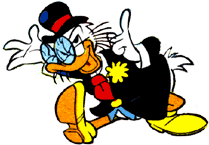
A notorious, Duckburg-based business rival of Scrooge's. He presumably holds the dubious honour of being the third richest duck in the world. John D. Rockerduck was created and used by Carl Barks in just one story, "Boat Buster", but for some bizarre reason, Brazilian and European writers almost always use him in Flintheart Glomgold's place and rarely acknowledge Flintheart's existence. Unlike Scrooge (and Glomgold), Rockerduck has no qualms about spending money if it suits him (which in some ways makes him somewhat more sensible than Scrooge), and he inherited his wealth from his hard working father, Howard Rockerduck, rather than earning it himself.
- Affably Evil: He can be pretty pleasant, unlike Glomgold.
- Ascended Extra
- Battle Butler: his secretary (usually called "Jeeves" in English translations) is a version - he is no bodyguard material, but he is a competent spy and saboteur and a Master of Disguise, in addition to do most of the work administrating Rockerduck's business empire.
- Breakout Villain
- Corrupt Corporate Executive
- Evil Counterpart/Foil/Shadow Archetype: Not surprisingly to Scrooge, though generally in a different way than Glomgold. If Glomgold can be described as what Scrooge would have become if he didn't have his sense of morality, then Rockerduck is a younger and arguably more modern Scrooge who was born into luxury. at least in the Don Rosa continuity.
- Even Evil Has Standards: He does have his moral standards—it depends on the story what he actually is willing to do (some stories have him gleefully perform sabotage, kidnappings and even outright theft, while others have him a more honest businessman), though unlike Glomgold, he is never portrayed as willing to stoop to murder.
- Friendly Enemy: Towards Scrooge and his allies, on occasion. Is arguably one of the major traits he has that differentiates him from Glomgold.
- Depending on the Writer: Rockerduck has sometimes helped Scrooge to foil the Beagle Boys for no other reason than that he can't stand thieves, but at other times has allied with them against Scrooge, acting almost like a thief himself.
- An European trait of his is eating his bowler hats after defeat.
- In fact, Rockerduck was in no way portrayed as a villain in his only Carl Barks story.
- Non-Idle Rich: A lot of fans who disdain Rockerduck for being born into luxury, tend to forget that he's good enough a businessman to easily rival Scrooge himself.
- Older Hero vs. Younger Villain
- Pet the Dog: He gets a few moments of this; notable was one Italian story where he thought Scrooge was dead and honestly grieved for him.
- Spoiled Brat: In Life And Times Of Scrooge, anyway.
- The One Who Wears Shoes
Neighbor J. Jones
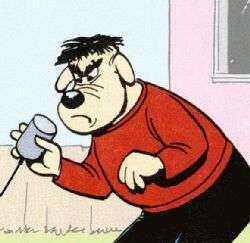
Donald's next door neighbor. He and Donald have a heated rivalry that comes close to being a full-fledged war, with the yard between their houses as the battlefield.
- Disproportionate Retribution: When we are given a reason for why Donald and Jones are fighting (if they themselves even remember it), it's usually something like this.
- Cranky Neighbor
- Jerkass - he's essentially a bigger, angrier Donald.
- Momma's Boy: His mother is the only one who can force him and Donald to "play nice."
- One Name Only - it's implied that either his first name is Jones, or his last name is Neighbor
- Er, no. It's more like his first name is problematic: Carl Barks called him Jughead, which can't be used today because there's a more famous Jughead Jones in comics.
- Sitcom Arch Nemesis
- Suspiciously Similar Substitute - in some European comics Donald has a second neighbor, Johnson. While Jones is as angry as Donald, Johnson is a cunning cheater and schemer.
P.J. McBrine/Argus McSwine
A pig-featured, mustachioed con man usually wearing a hat and a black coat. Created by Barks, he's appeared under many different names such as "Scalpnik" and "Porkman de Lardo".
- Obviously Evil
- Zany Scheme: His plots have included stuff like turning pineapples to stone with a poison or destroying Duckburg's cucumber crop so he could sell his own unpalatable foodstuffs ("Forbidden Valley", his first appearance).
Canon Foreigners from DuckTales (1987)
Characters who were created exclusively for the Animated Adaptation series, DuckTales (1987).
Launchpad McQuack
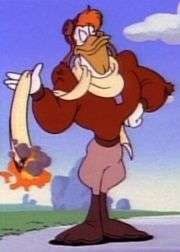
A tall, strapping pilot who worked as Scrooge's go-to guy for piloting, but with a bad habit of pulling off crash landings. Later became Darkwing Duck's sidekick.
- Awesome McCoolname
- Canon Immigrant: He is the only character from DuckTales (1987) to star in his own comics even long after the show ended its run.
- Captain Crash
- The Ditz: Sometimes going into Genius Ditz area. Not only is he several times shown being quite inventive and capable in a pinch, at one point he manages to work the Gizmoduck suit, and by the time he made the migration to Darkwing Duck had managed to singlehandedly build a gadget-laden, VTOL and hover-capable subsonic jet plane.
- Even before that, one episode had a situation that was an homage to The Flight of the Phoenix, where Launchpad managed to cobble together a working plane out of wreckage from the crash and various other junk... and then, of course, once he and Scrooge had gotten (mostly) to safety, he crashed it.
- Expy: Another Expy of Donald. Mostly filling Donald's roles of "in charge of travel" and "saying stupid things".
- Goggles Do Nothing
- Lantern Bill of Justice
- Scarf of Asskicking
- Universal Driver's License: If it has wings, he can crash it.
Fenton Crackshell / Gizmoduck
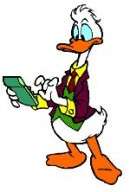
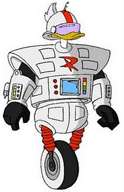
Scrooge's accountant in the second season of DuckTales (1987), who possesses an almost supernatural ability to count things very quickly with only a quick glace. He also guards the Money Bin as Gizmoduck.
- Affectionate Parody: Of Robocop.
- Butt Monkey: In keeping with his nature as Expy for Donald, has a tendency to become one; usually he stops being one when he becomes Gizmoduck, but this isn't always the case.
- By the Power of Greyskull: "Blatherin' blatherskite!" This was actually a Catch Phrase he used even before the Gizmosuit was built; he really only needs to say "blatherskite" to become Gizmoduck.
- Clothes Make the Superman
- Expy: Fills in Donald's missing role; especially glaring in episodes based on Barks' comics such as "The Land of Tra La La."
- Genius Ditz: To quote the manual for the video game DuckTales (1987): The Quest For Gold: "Fenton can count faster than the speed of sound, but his judgement is not always very sound."
- Good with Numbers: He got the job as Scrooge's accountant by counting how many shotgun pellets Scrooge fired at him to scare him away.
- Up to Eleven: He can count Scrooge's entire fortune right down to the cent, in a matter of seconds.
- Beyond the Impossible: And he once did it while that fortune was sitting at the bottom of a lake, just by putting on goggles and sticking his head underwater briefly.
- Up to Eleven: He can count Scrooge's entire fortune right down to the cent, in a matter of seconds.
- Large Ham: Especially when he's Gizmoduck.
- Momma's Boy: Occasionally crossing into just a bit of:
- My Beloved Smother: They Really Do Love Each Other though... on at least one occasion, Fenton was in trouble, and his mother (despite hating to leave her trailer) donned the Gizmoduck suit and went to save him.
- Part-Time Hero
- Secret Keeper: The only ones who know him being Gizmoduck are Scrooge and his mother.
- Something Person
- Superhero: The straightest example on the show.
- Spotlight-Stealing Squad: He was introduced in the second season of DuckTales (1987) and almost immediately became the show's main character apart from Scrooge himself.
- Visual Pun: Before going to work directly for Scrooge, Fenton's putting his counting skills to work as a bean counter... literally. He counts beans for a living.
Webbigail "Webby" Vanderquack

A young female duckling who lives with her grandmother, Mrs. Beakley, in Scrooge's mansion.
- Cheerful Child
- Children Are Innocent: Depends a little on the episode just how innocent and naive she really is, but she is definitely this trope, sometimes bordering on Friend to All Living Things.
- Composite Character: She is a single-character Expy of Daisy's nieces.
- Interestingly enough, in the Dutch dub of DuckTales (1987) she is named "Lizzy," which is the Dutch name for April.
- Tagalong Kid: Huey, Dewey and Louie tend to view her as this as she is both younger than them, and a girl. It varies how much they tolerate her; for the most part they're willing to let her hang out with them, but they loathe it when she tries to arrange tea parties and suchlike.
- Morality Pet: More than any other character in DuckTales (1987), she is this to Scrooge.
- Pink Means Feminine: Her outfit is pink, and she's very much a girly-girl.
- Ship Tease: With Doofus; though they usually don't interact much, one Time Travel episode showed them as married adults.
- Women Are Wiser: Despite her youth and naivete, episodes would often find a way to have her suddenly be the only one in the otherwise all-male party with any common sense.
Doofus Drake

A chubby Junior Woodchuck, friend to Huey, Dewey and Louie, and Launchpad's biggest fan.
- Big Eater: Not to the extent of, say, Gus Goose, but still.
- Blind Without'Em
- Hero Worshipper: To Launchpad.
- Chuck Cunningham Syndrome: In the second season. He only showed up in one single non-speaking cameo in one episode and afterwards was never seen or mentioned again—perhaps because both Launchpad and (to a lesser extent) Huey, Dewey and Louie were moved Out of Focus in this season, and sice Doofus was mostly there to interact with them, there was no real room for him in the scripts anymore.
- Ship Tease: With Webby; according to one Time Travel episode they marry some time in the future. (Of course, that particular future will no longer come to pass, but Scrooge acts as though he's convinced Webby and Doofus will still marry.)
- Sidekick: Sometimes to Huey, Dewey and Louie, sometimes to Launchpad.
- The Klutz
- Meaningful Name: His parents were either very cruel or very foreseeing when they decided to name him "Doofus." Unless, of course, it's a nickname, in which case it becomes another trope entirely.
- Nice Guy: Doofus by name and doofus by nature, but nobody can deny that he's a good-hearted one.
Bubba the Cave Duck & Tootsie the Triceratops
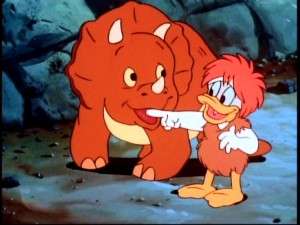
A young caveduck and his pet dinosaur who stowed away with Scrooge and company during a time-traveling trip.
- All Animals Are Dogs: Tootsie acts more like a Big Friendly Dog than a dinosaur.
- Big Friendly Dinosaur: Tootsie.
- Demoted to Extra: Immediately after the five episodes that served as his introduction. Despite supposedly living with Scrooge, he was absent for most episodes after that and only got a few cameo appearances and a couple of Day in The Limelight episodes.
- Expy: Bubba is essentially what you'd get if you turned Bamm-Bamm Rubble into a duck.
- Flowers for Algernon Syndrome: Bubba went though this in "Bubba's Big Brainstorm."
- You No Take Candle: Being a caveduck, Bubba talks like this, and also he never quite seems to grasp that Scrooge's name isn't "Skooge."
Duckworth

Scrooge's butler and chauffeur in DuckTales (1987), who has actually also appeared in some non-Rosa comics. It should be noted that though Duckworth himself was a DuckTales (1987) creation, the idea of Scrooge having a butler ranges as far back as to Scrooge's first story, The Christmas on Bear Mountain. Italian comics have a similar character named Battista as Scrooge's butler, and the Mexican dub of the animated series actually translated Duckworth as "Battista".
- A Day in the Limelight: For the most part, he's mostly a background character who gets a few minor moments here and there, but he did get two episodes that centered on him, Duckworth's Revolt and Take Me Out of the Ballgame.
- Fake Brit: Speaks in an appoximation of an upper-class English accent, though his voice actor Chuck McCann is from New York.
- Jack of All Trades: Not quite a Renaissance Man, but still highly skilled at a variety of tasks. Which is good, considering that Scrooge isn't going to pay for a large household staff when one man can do the job.
- The Jeeves: He's not omnicompetent, but he knows how to run house with meager money he gets from his Boss.
- Non-Indicative Name: Despite being named "Duckworth" and appearing in a show where most of the central characters are ducks, he himself is the only regularly recurring character who is not a duck or a bird of some kind, but rather a classic Dogface.
- Servile Snarker: Not the most obvious example of this trope, but he has his moments.
- The Stoic: It takes a lot for him to drop his stone-faced exterior.
Mrs. Bentina Beakley
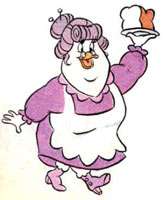
Scrooge's maid and the nephews' nanny, hired because she offered to work for nothing except food and shelter for herself and her granddaughter Webby.
- Apron Matron: At least in the beginning; though less strict and more soft-spoken than most examples of the trope. Of course, she didn't quite stay that way: see below.
- Chickification: In the first episode, she was able to put up with everything the nephews could throw at her. In DuckTales the Movie: Treasure of the Lost Lamp, she's spooked by their toys coming to life and has several fainting spells.
- Cool Old Lady: Originally; see above.
- Expy: For Grandma Duck, who weirdly enough never appears in DuckTales (1987)—even though she would probably be a more natural choice for Donald to send his nephews to than Scrooge.
- Granny Classic
- Team Mom: She plays this role on occasion, especially in the first season.
Admiral Grimitz
Donald's comanding officer while he worked in the Navy
- Ax Crazy: He loves it when things go ka-blooey!
- Hey, It's That Voice!: Provided by none other than Peter Cullen, in an impression of John Wayne.
Merlock
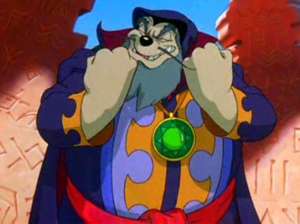
A ruthless, immortal, shape-shifting sorceror who goes on the warpath when Scrooge gets hold of the magic lamp in DuckTales the Movie: Treasure of the Lost Lamp. He was one of the Genie's former masters, and will do anything to get him back into his clutches.
- Arson, Murder, and Jaywalking: He sank Atlantis, destroyed Pompeii using Vesuvius, and created anchovy pizza.
- Atlantis: Ever wonder why Atlantis really sank?
- Disney Villain Death: He managed to survive this and became the final boss in Donald Duck Goin' Quackers.
- Evil Is Hammy
- Evil Sorcerer
- A God Am I
- Hair-Trigger Temper
- Immortality Immorality: His first wish to the Genie was to live forever.
- Large Ham: To be expected, considering his voice actor.
- One-Winged Angel
- Our Gryphons Are Different: Turns into one for his One-Winged Angel act.
- Three Wishes: His talisman allows him to bypass this rule.
El Capitan
A former sea captain who's even more greedy and miserly than Scrooge is; he literally goes insane with gold fever and will go to any lengths to retrieve even a lost penny -- even if it should risk losing all his other money or even his life. Appears in the five-part pilot for DuckTales (1987).
- Jim Cummings
- Really Seven Hundred Years Old: Hinted to be several centuries old, having stayed alive out of pure greed and not wanting anyone else to get their hands on his money.
Dijon the Thief
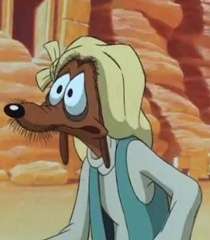
A kleptomaniac who's always going after valuable treasures but has trouble keeping them. He's occasionally hired by other villains to aid them in their goals, and has been seen working for both Flintheart Glomgold and Merlock -- though he's really not such a bad person when it comes down to it.
- Butt Monkey: Yep.
- Ineffectual Sympathetic Villain: He does occasionally manage to pull off some impressive jobs of thievery, but all in all he is a fairly Harmless Villain who's more a slave to his own kleptomania than anything else.
- I See London: A Running Gag with him is that he'll lose his pants because he's stuffed his pockets too heavy with his loot... and yes, he wears Goofy Print Underwear.
- Lovable Coward: When danger lurks, Dijon will step up and... make any excuse not to have to face it.
- Minion with an F In Evil: To Merlock in DuckTales the Movie: Treasure of the Lost Lamp and to Flintheart Glomgold in the series.
- Sticky Fingers: It's an obsession with him.